Water glassing eggs is the perfect method for preserving farm-fresh eggs for the winter months, when hens lay little to no eggs on the homestead (or in the backyard). Follow these super-simple steps to have delicious eggs year-round. Saves you money by preserving eggs for 12-18 months!
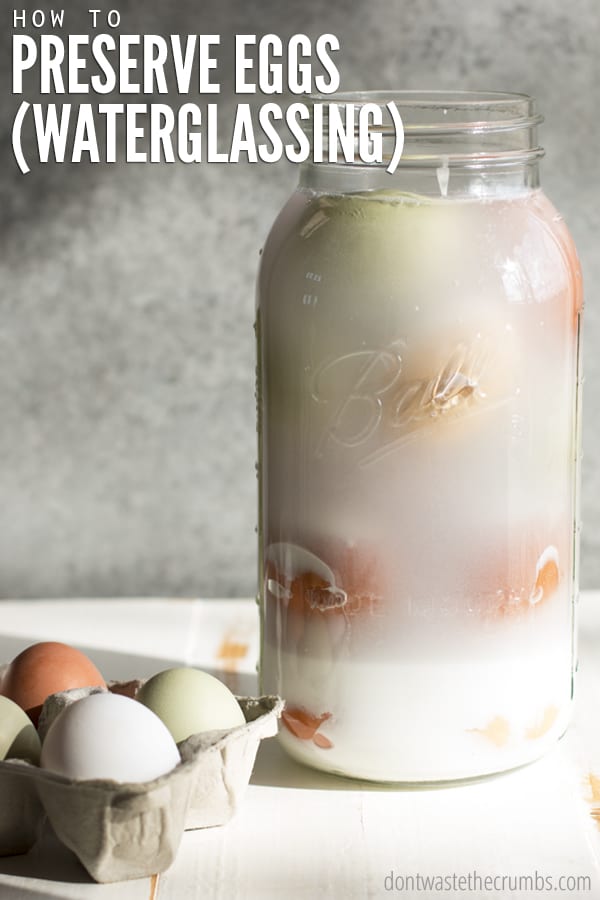
As homesteaders, we have learned (and accomplished) SO MUCH since we moved to our homestead last year. I can’t wait to share everything with you, so stay tuned for some great upcoming posts.
Recently, I posted on how to raise backyard chickens where I share “all the things” about raising chickens – the pros and cons of raising them; the cost breakdowns for budgeting; plus happy hen care for having a supply of eggs for the whole family.
Well, guess what? I learned that hens lay very few eggs in the cooler months between fall and spring when there is little daylight. Yes, daylight dictates the number of eggs the hens will lay! With this in mind, I immediately got to preserving the eggs our hens lay with a method that homesteaders have used for generations: Water-glassing eggs!
What is water-glassing?
Water glassing eggs means that we are storing clean and unwashed eggs (clean meaning no poop, mud, or debris on them) in jars of pickling lime and water so that the shell is sealed and perfectly preserved.
What you get are super fresh and delicious eggs – for 12 to 18 months! Trust me, this method is SUPER fun and easy. Once you do it and reap the benefits of saving money and maintaining your ongoing supply of beautifully preserved eggs, you will want to create your own tradition of water glassing eggs for years to come!
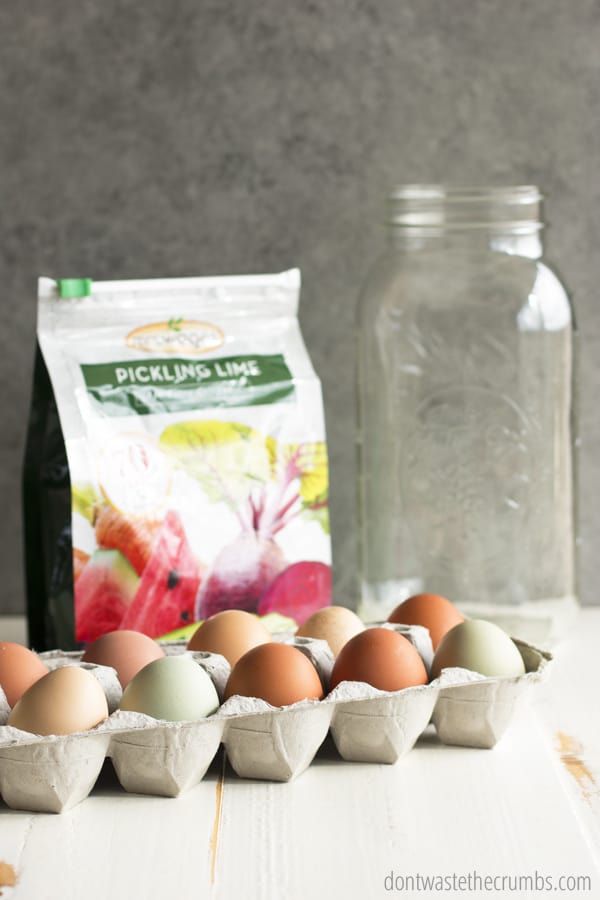
Ingredients for waterglassed eggs
- pickling lime
- filtered water
- Clean unwashed eggs (clean meaning fully intact with no poop, mud, or debris on them)
Supplies you need:
- Half-gallon glass jar
- Kitchen scale (for weighing the pickling lime)
- Eggs (you can do this method with any type of egg – chicken, duck, quail)
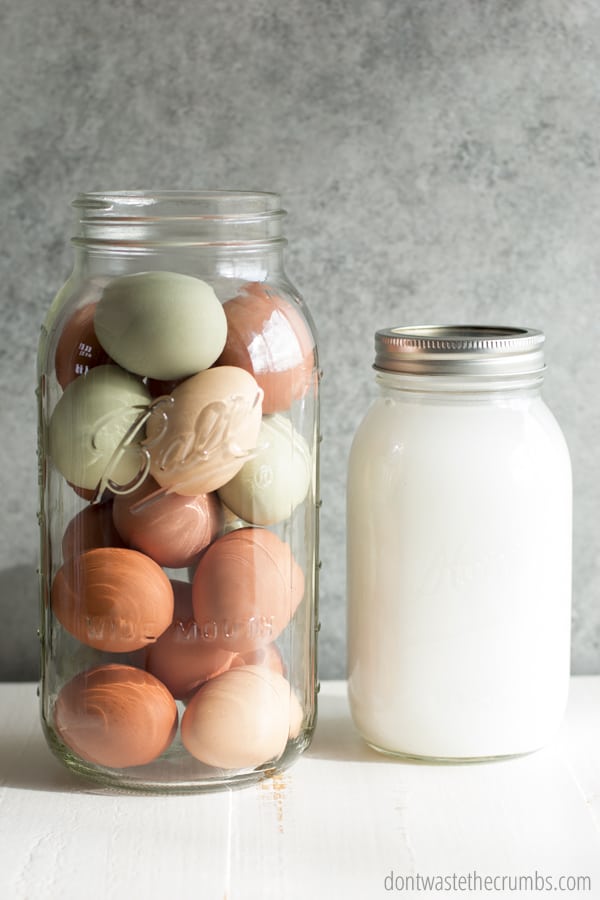
How To Water Glass Eggs
Step 1. Use your kitchen scale to measure 1 ounce of pickling lime.
Step 2. To a clean half-gallon glass jar, add the pickling lime and then fill it up halfway with filtered water. (If you have to use chlorinated water, let the water sit in the jar uncovered for 24 hours before using, so the chlorine has time to evaporate).
Step 3. Thoroughly mix the lime into the water (using a whisk) until the solution is incorporated fully.
Step 4. Carefully add the eggs to the half-gallon jar. Be sure to place the pointy side down.
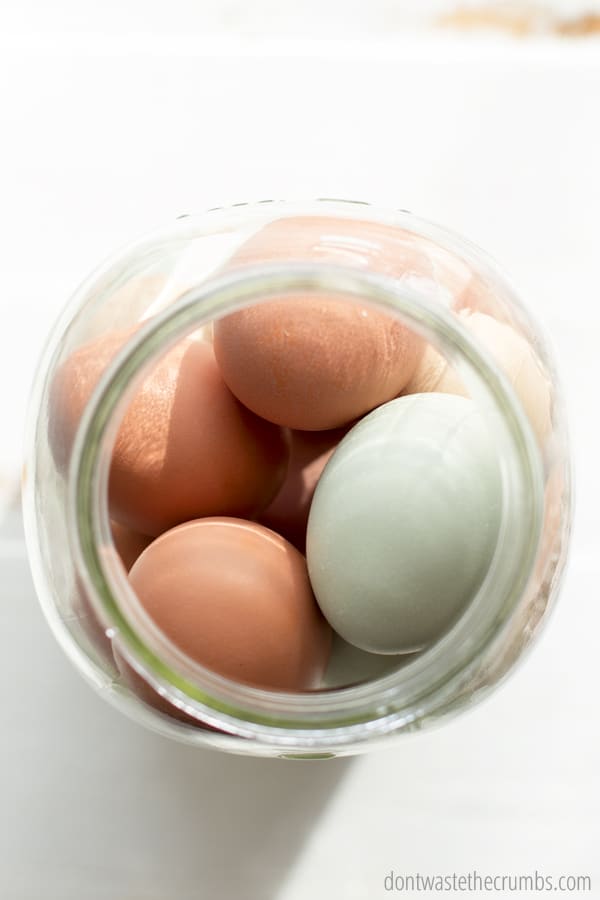
Step 5. Top off with additional filtered water if needed.
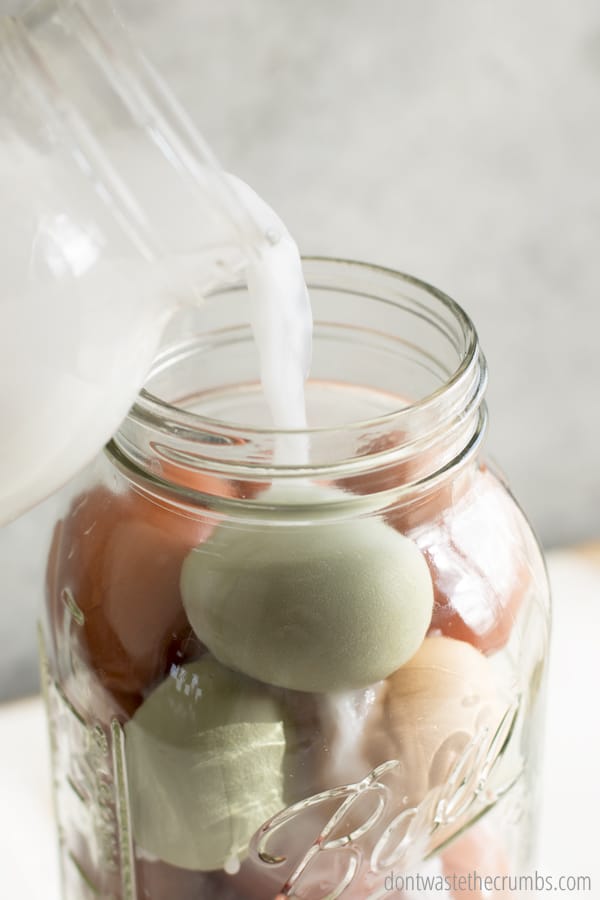
Step 6. Cover with an airtight lid. You are preventing the oxygen from getting in, and also you’re keeping the water from evaporating.
Step 7. Store your freshly water-glassed eggs in a dark and cool place.
That’s all there is to it!
Note: As you might notice from the pictures, I have also mixed the lime/water in a quart jar first and then I’ve poured it over the eggs in the half-gallon jar. However, I prefer to just mix it right into the half-gallon jar and then add the eggs, as noted in the instructions above and in the recipe card.
Tips for waterglassing eggs
- You can’t pour any lime solution down the sink drain, so go ahead and pour it into your garden!
- Reduce dishes by using just the half-gallon jars, rather than measuring into a quart jar first.
How to use water glassed eggs
You simply pull out the eggs you need and wash them before eating or using in your favorite recipes. Any unused eggs that you pull from the solution should be kept in the fridge and used at your earliest convenience.
I prefer using half gallon jars because gallon jars fit too many eggs – it becomes too heavy and they could break if you move the jar. Also, a quart jar is definitely too small.
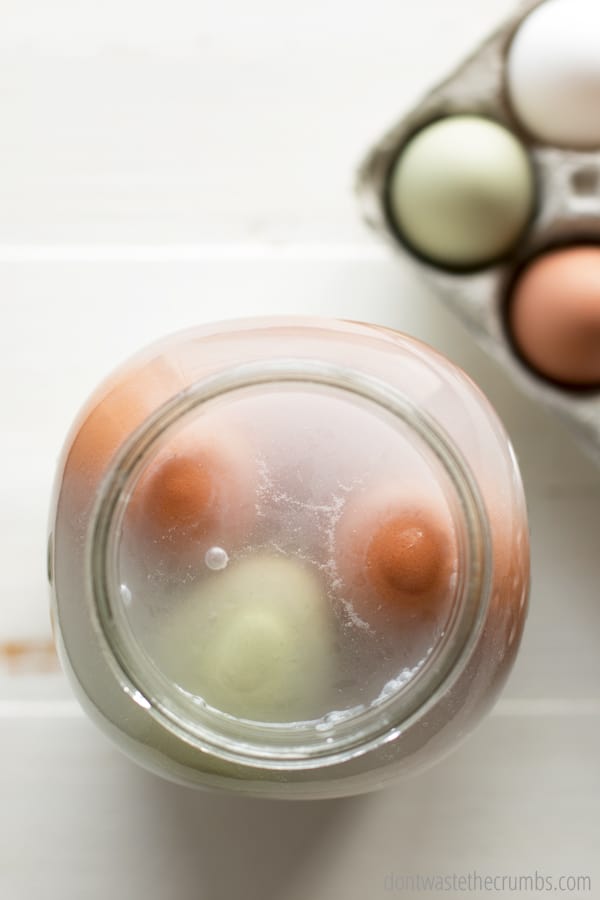
FAQs for water glassing eggs
Why should I preserve eggs?
Have you ever noticed that eggs are actually seasonal? The hen’s cycles are dictated by the length of the day. In the cool / cold months, hens lay very few eggs because the daylight is so short at those times. Chickens naturally reach their peak egg-laying time during the longest days of the year. Warm weather also affects the hens, so they are likely to lay more eggs as it warms up in your region. It’s a great idea to preserve eggs during times when the hens are at their peak production.
Can I water glass store-bought eggs?
No, you cannot water glass store bought eggs. Store bought eggs do not have the protective “bloom” on them that is naturally protective as soon as the eggs are laid (which is why you might see homesteaders with a pile of eggs out on the countertop). The lime solution works with the bloom to preserve the eggs.
Can I use tap water to water glass eggs?
I definitely recommend using filtered water. If you must use tap water, be sure to leave the water out on the counter for 24 hours beforehand, so the chlorine can evaporate.
How many eggs will fit into a half-gallon jar for waterglassing?
You will be able to fit about 16-18 eggs in one half-gallon jar. I think you should cap it at 18 eggs, so they are all fully submerged in the solution.
Should I boil waterglassed eggs?
Yes, go ahead and hard boil your eggs that have been water glassed, BUT be sure to poke a small hole in the shell first. The water / lime solution seals the egg, while actually filling the tiny pores of the eggshell. You don’t want to have exploded eggs!
Are water glassed eggs safe to eat?
As long as you were careful about following all of the steps, water glassed eggs are perfectly safe. Remember to use very clean jars & utensils and always clean, unwashed eggs. If your eggs have gone bad, there will be a smell.

30 Minute Dinners Sample Meal Plan
Sign up to get instant access to my 30 Minute Dinners Sample Meal Plan, complete with recipes and step-by-step instructions!More Food Preservation Tips
Water Glassing Eggs
Water glassing eggs is the perfect method for preserving farm-fresh eggs for the winter months, when hens lay little to no eggs on the homestead or in the backyard. Follow these super-simple steps to have delicious eggs year-round. Saves you money by preserving eggs for 12-18 months!
- Prep Time: 20 minutes
- Cook Time: N/A
- Total Time: N/A
- Yield: 18 preserved eggs 1x
- Category: DIY
- Method: preserving
- Cuisine: American
Ingredients
- 1 ounce pickling lime
- 1 quart filtered water
- Clean unwashed eggs (clean meaning fully intact with no poop, mud, or debris on them)
What you need:
- Half-gallon glass jar
- Kitchen scale (for weighing the pickling lime)
- Eggs (you can do this method with any type of egg – chicken, duck, quail)
Instructions
- Use your kitchen scale to measure 1 ounce of pickling lime.
- To a clean half-gallon jar, add the pickling lime and then fill it up halfway with filtered water. (If you have to use chlorinated water, let the water sit in the jar uncovered for 24 hours before using, so the chlorine has time to evaporate).
- Thoroughly mix the lime into the water (using a whisk) until the solution is incorporated fully.
- Carefully add the eggs to the half-gallon jar. Be sure to place the pointy side down.
- Top off with additional filtered water if needed.
- Cover with an airtight lid. You are preventing the oxygen from getting in, and also you’re keeping the water from evaporating.
- Store your freshly water-glassed eggs in a dark and cool place.
Notes
Note: I have also mixed the lime/water in a quart jar [which is half of a half-gallon] first and then pour it over the eggs in the half-gallon jar, but I prefer to just mix it right into the half-gallon jar and then add the eggs, as noted above.
Nutrition
- Serving Size: 1
- Calories: 66
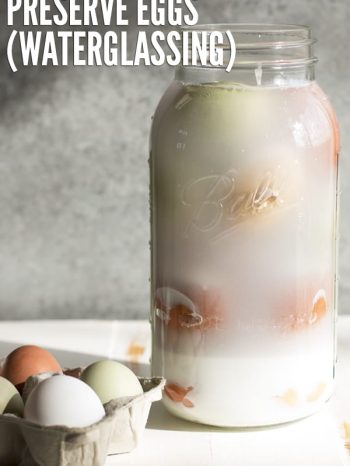
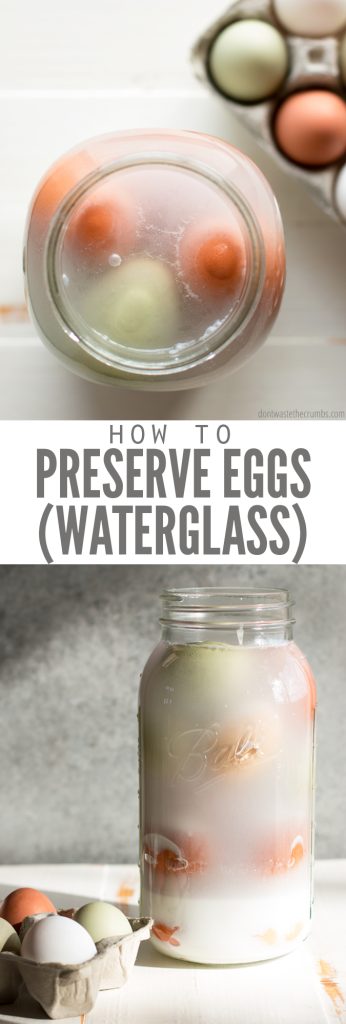

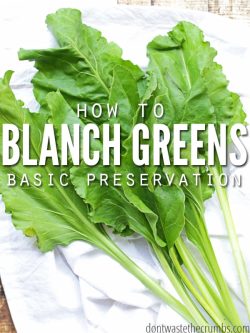
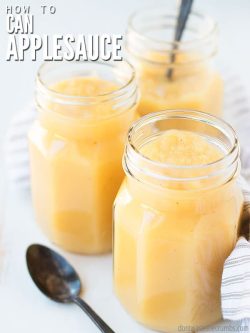
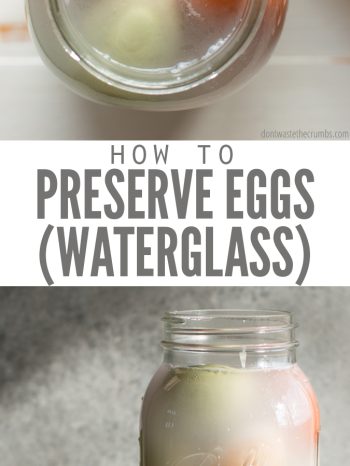
Do you have to hard boil the eggs to water bath them. I was wanting to just pull one out & scramble or fry when I like? How can I do them please?
Hello Cheri,
To water glass eggs, they are not hard boiled. Hope this helps!